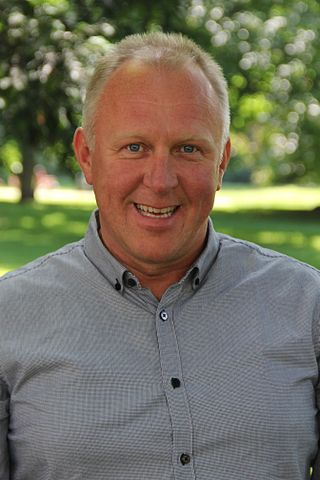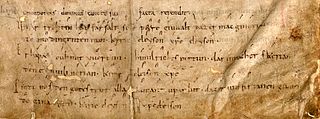
Neues Geistliches Lied, abbreviated NGL, is a music genre of songs in German intended for church usage, and based on contemporary lyrics and with music by contemporary composers.

Eugen Eckert is a German social worker, minister, singer-songwriter and academic teacher. He is known for his lyrics for new spiritual songs, and his oratorios and musical plays.
Winfried Heurich is a German organist and composer. He was director of church music at Liebfrauen, Frankfurt from 1966 to 2000 and composed music for more than 400 songs.

Patrick Dehm is a German Catholic theologian, supervisor and clinical Gestalt therapist. He and his brother founded the Eugen Dehm foundation, supporting a holistic health concept, in memory of their father.
inTAKT is a German ecumenical association (Verein) for the promotion of new Christian songs for church services, and of art, culture and musical education. Its members are mostly hymnwriters and composers interested in NGL.

The Leise or Leis is a genre of vernacular medieval church song. They appear to have originated in the German-speaking regions, but are also found in Scandinavia, and are a precursor of Protestant church music.

"Glauben können wie du" is a Christian poem by Helmut Schlegel, written in 2009, and made a hymn of the genre Neues Geistliches Lied with a melody by Joachim Raabe the same year. It addresses Mary, the mother of Jesus, to be imitated living the theological virtues of faith, hope and love. The song is included in song books and the Catholic hymnal Gotteslob.

"Gott, der du warst und bist und bleibst" is a Christian hymn with text by Eugen Eckert and a melody by Herbert Heine. It is also known by the title of its refrain, "Wir haben hier keine bleibende Stadt". The song was written in 1993, in the genre Neues Geistliches Lied (NGL). It appears in several regional sections of the German Catholic hymnal Gotteslob, and in other songbooks.

"Lamm Gottes, für uns gegeben" is a Christian hymn in German with text by Eugen Eckert and a tune by Horst Christill. It is of the genre Neues Geistliches Lied. The song reflects the liturgical Agnus Dei. It is part of regional sections of the common German Catholic hymnal.

"Jesus Christus, Sohn des Lebens" is a Christian hymn of the genre Neues Geistliches Lied by Eugen Eckert, with a melody by Peter Reulein. The song is an extended paraphrase of the Agnus Dei. It is part of hymnals and songbooks.
"Hilf, Herr meines Lebens" is a Christian hymn, with a text mostly written in 1961 by Gustav Lohmann, and a melody composed the following year by Hans Puls. The song, of the genre Neues Geistliches Lied (NGL), is part of German hymnals, including Gotteslob, and songbooks. It begins: "Hilf, Herr meines Lebens, dass ich nicht vergebens hier auf Erden bin".
Habakuk is a German pop band from Frankfurt, formed in 1975. The group is focused on new Christian music of the genre Neues Geistliches Lied.

"Bewahre uns, Gott" is a Christian hymn with text by Eugen Eckert to a melody from Argentina, of "La paz del Señor". The song of the genre Neues Geistliches Lied, a prayer for protection in hard times, is contained in several hymnals and songbooks ecumenically. Several of these list it as "Bewahre uns, Gott, behüte uns, Gott"
"Wo ein Mensch Vertrauen gibt" is a Christian hymn with text by Hans-Jürgen Netz, written in 1974, with a melody by Winfried Heurich and Fritz Baltruweit. The song of the genre Neues Geistliches Lied was included in hymnals and songbooks.

"Auf zu neuen Horizonten" is a Christian hymn with text by Helmut Schlegel, and music by Stephan Sahm. It is of the genre Neues Geistliches Lied. The song is included in the Catholic hymnal for young people, Ein Segen sein, and other songbooks.

"Was mein Herz schwer macht" is a 2001 Christian song with text by Eugen Eckert, with a melody by Jürgen Kandziora. The hymn of the genre Neues Geistliches Lied is contained in several hymnals and songbooks.

"Weite Räume meinen Füßen" is a Christian hymn in German with text by Eugen Eckert and a tune by Alejandro Veciana. It is based on a verse from Psalm 31, "Du stellst meine Füße auf weiten Raum", which forms the refrain. Its topics are the broad perspectives of life. The song of the genre Neues Geistliches Lied is part of many hymnals and songbooks.
"Alle meine Quellen entspringen in dir" is a Christian hymn in German with text and melody by Leonore Heinzl. She wrote it in 1984, based on a verse from Psalm 87, which forms the refrain. The song of the genre Neues Geistliches Lied is part of many hymnals and songbooks.

"Eingeladen zum Fest des Glaubens" is a Christian hymn with text by Eugen Eckert, written in 1989, and a melody by Alejandro Veciana. It is also known by the first line "Aus den Dörfern". A hymn of the genre Neues Geistliches Lied, it is part of regional sections of the common German Catholic hymnal Gotteslob, and of other songbooks.






